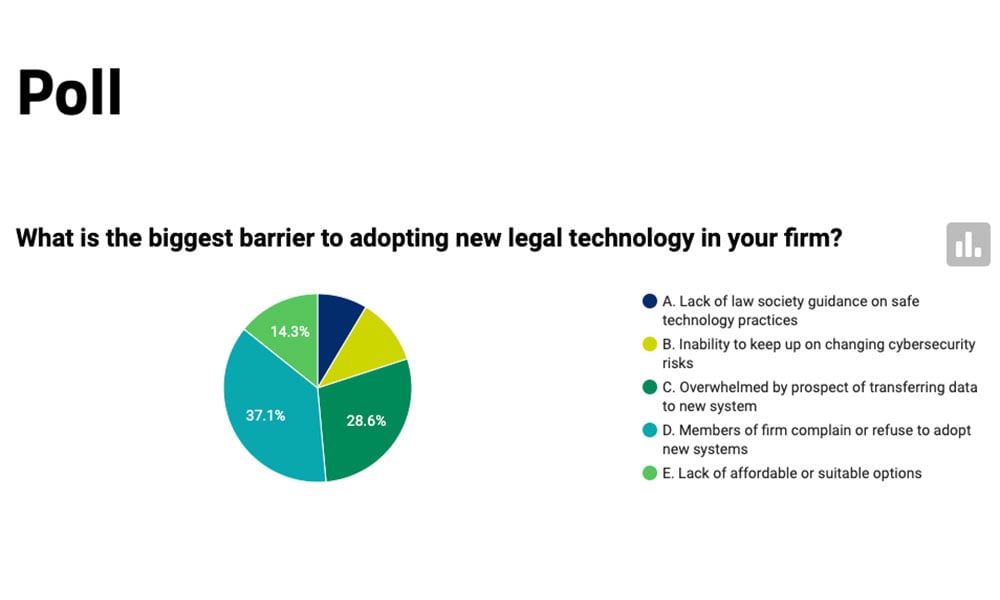
Poll says biggest hurdles for implementing technology in firms can be how people feel about change

A poll of Law Times readers suggests that the biggest hurdles for implementing technology in firms can be how people feel about change.
Law Times asked readers, “What is the biggest barrier to adopting new legal technology in your firm?” Thirty-seven per cent of respondents, or 13 votes, said that “members of firm complain or refuse to adopt new systems.” Another 10 voters, nearly 29 per cent of responses, said that the firm was “overwhelmed by the prospect of transferring data to a new system.”
The non-scientific poll, which did not record who voted, also captured a smattering of other concerns, including: a lack of affordable or suitable technology options (five votes), Inability to keep up on changing cybersecurity risks (four votes) and lack of law society guidance on safe technology practices (three votes).
A separate survey of 150 lawyers in Canada last year found that “aside from legal knowledge, practice area expertise and technology skills are the two most important criteria to employers when hiring lawyers.” Yet, as the Financial Times noted last fall, “lawyers now recognise that the sector has to change, and fast, but the problem now is too much technology.”
Speakers at Canadian Lawyer’s LegalTech Summit, which is taking place in Toronto on May 26, have found their own ways to harness the seemingly endless technology changes that keep coming their way.
Sondra Rebenchuk, who leads legal technology and process improvement for Blake, Cassels & Graydon LLP, says that it has been difficult for her to convince lawyers that they can still get use out of an imperfect system.
“A lot of the new technology in the legal space is helping to address pain points in very specific tasks. So, whether it's contract review, generating signature page packages, automating agreements that are drafted over and over and over again — these are all very tiny pieces of work,” she says.
“So, start to get comfortable with the fact that the technology will not be perfect. It won't be able to do exactly what you can do. Setting the right expectations will make people more successful.”
Qoratia Parmanand, legal counsel at Shopify, found it helpful to trade one of the most relentless tech intrusions — email — with something more visual.
“Email is no longer enough,” Parmanand told Canadian Lawyer InHouse. “We need tools that allow a team member to communicate a host of information in as simple a form as possible. For instance: where they are in the world, what time zone they’re in, whether they are online or not, and whether they are available to talk – all this using simple online, visual cues.”
“The world in which tech companies operate – especially Shopify – is one where you need to be able to exchange ideas as quickly as possible, across both small and wide-reaching audiences, in a way that’s aligned with the incredible pace at which people in this company are moving,” says Parmanand.
Tanya Walker, a bencher and tech enthusiast who runs her own firm, says the LSO’s technology committee is working on guidelines to help lawyers assess the risks of technology.
“I think that [lawyers] by nature are conservative. We like to mitigate against risk. And we wouldn't want to be involved in something that's risky, and that could potentially affect the welfare of our clients. So sometimes I hear, ‘the most secure form of communication is a fax’,” she says.
“I think it is incumbent on a lawyer, if there's something that you can do to save costs and time for the client, then you really should at least try or be open to it . . . . keep yourself open to learning.”